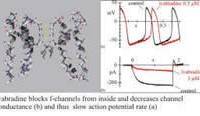
Drugs able to selectively block f-channels have a potential therapeutic use in those cases where it is useful to slow heart rate without altering other cardiovascular functions such as the ventricular contractility. Several molecules able to block the pacemaker f-channels such as zetabradine, ZD7288 and ivabradine have been developed in the past, but only ivabradine has passed all clinical trials and is now marketed as an antianginal drug in several countries with the commercial name of Procoralan. Its beneficial effect consists of a selective lowering of heart rate, with no significant adverse actions such as a reduced inotropim, a side-effect typical of less specific heart-rate inhibitors like beta-blockers or calcium antagonists. The heart-rate inhibiting action of ivabradine is due to a selective block of f-channels. Our group has shown that ivabradine blocks sinoatrial If in a use- and current-dependent way (Bucchi et al., 2002). The characterization of the blocking effect of ivabradine has also been extended to the HCN isoforms HCN1 and HCN4 (Bucchi et al, 2006). This has revealed unexpected differences in the mechanism of block of the two isoforms: while ivabradine behaves as an "open channel" blocker with native f-channels and HCN4 channels, it behaves as a "closed channel" blocker with HCN1 channels. Differences in the modes of action of the drug can be exploited to develop new molecules with higher isoform-specificity.


